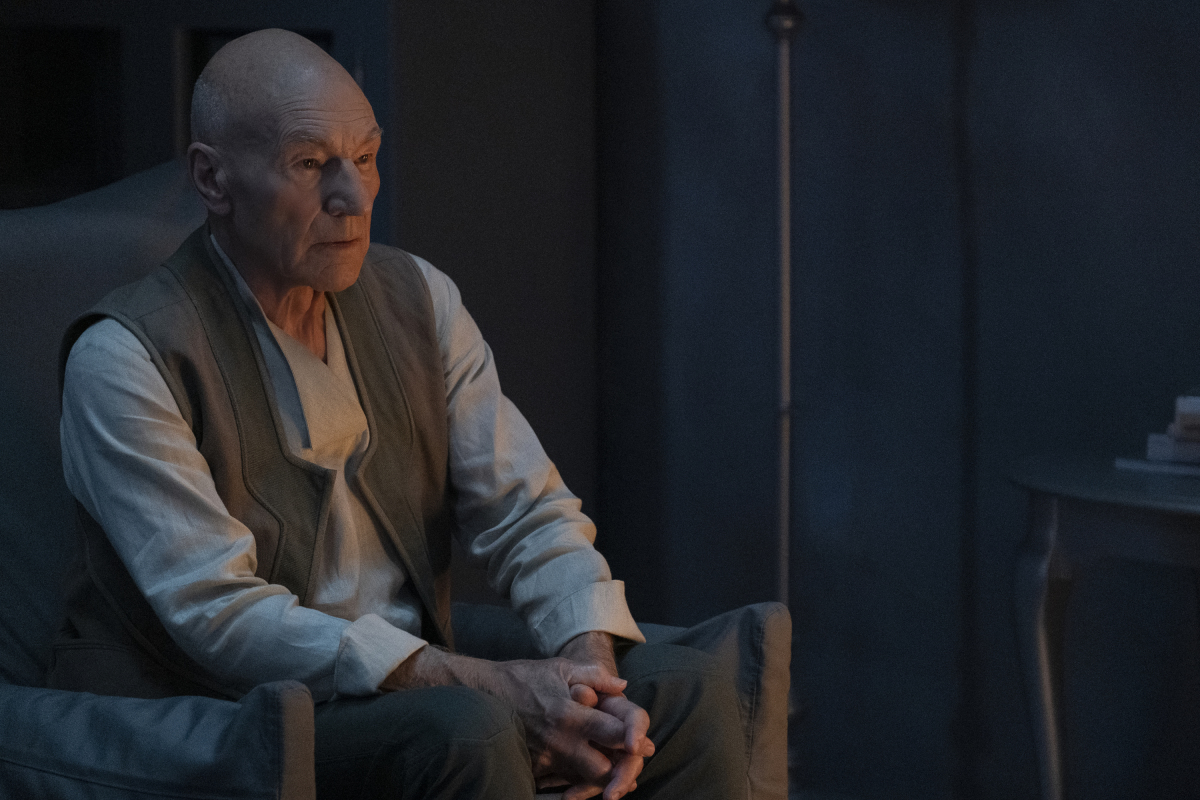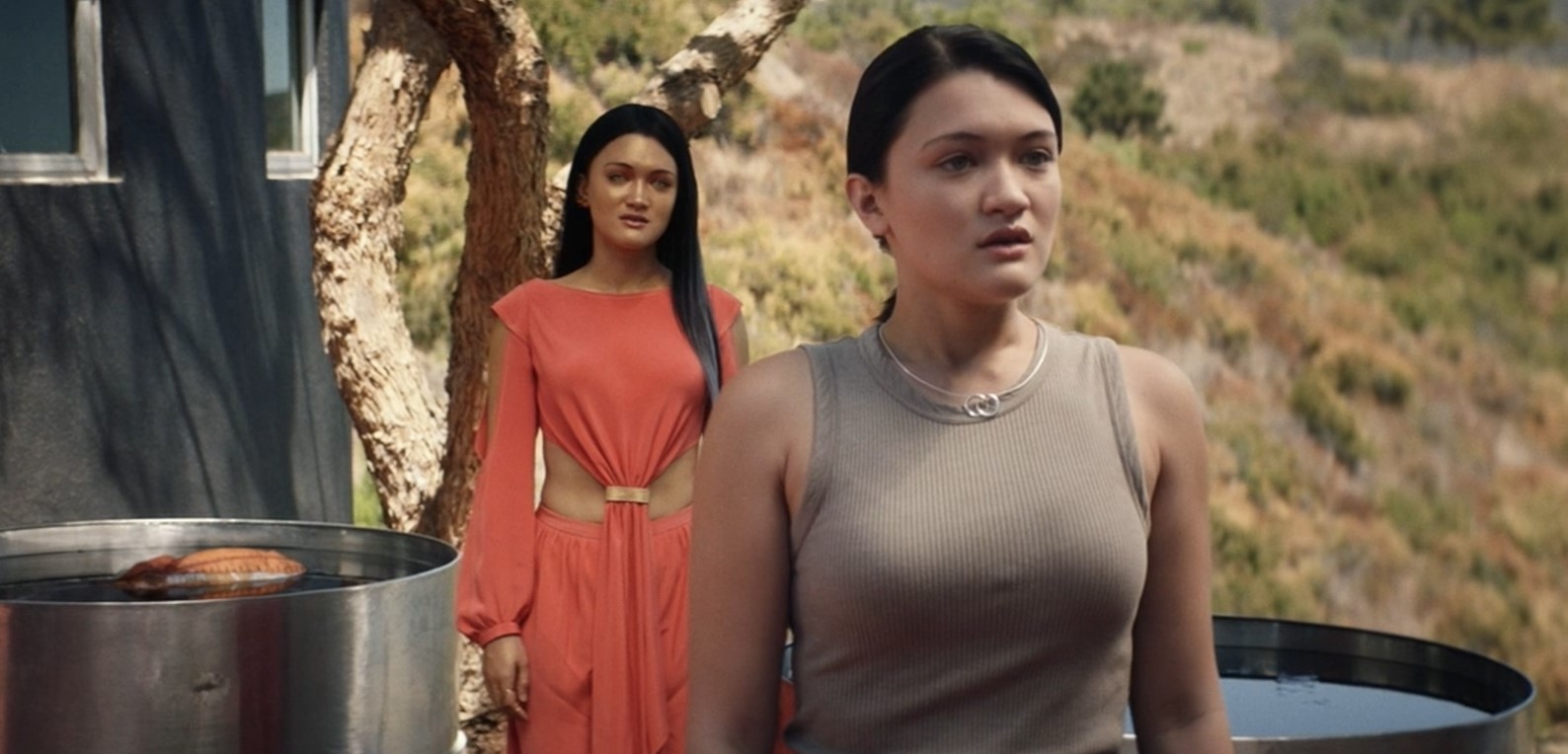
Book tour considerations (and then sudden book tour cancellations) kept us from reviewing this season past its midway point, which may have been fortunate for us, because that’s about the time the show started showing serious strain. Personally, we were loving the show’s forward-thinking approach, not only on the status of its aged main character, but on the universe in which he lived, extrapolated from various dangling strands of Trek lore. We liked a frail, embittered Picard working his way back to stature and heroism. We liked that a universe in which the Romulans were refugees and the Borg more or less vanquished, there were power struggles and political strife occurring. As much as we enjoy the clean, optimistic future in which the character of Picard was first envisioned, we think Star Trek always works best when it reflects the times in which it airs, and for us, a Trek show that looked at bigotry, anti-refugee sentiments, aging, AI, and a political alliance in decline could not have been better suited for 2020.
In retrospect, we have two criticisms of the series that plagued it from the start, both of which were at least partially addressed by the end of the season. The first was that, despite Patrick Stewart’s fine work, as well as a supporting cast that really doesn’t have any weak spots as far as we can see, the show lacked an emotional core. The structure of the show – extremely well-known and understood main character totally surrounded by strangers and ciphers – left it fairly unbalanced in its depiction of relationships. Everything with Picard at the center resonated. Every time other characters tried to have some sort of arc, it felt either unearned or undeveloped. Sure, we felt bad for Agnes that she got tricked into killing her ex or for Raffi because her son’s a brat, but it was hard to really care all that much or to feel that it served the story all that well. We were fine with the show’s insistence on giving Picard new settings and cohorts. We didn’t want a rehash of Next Gen or a series devoted to nostalgia. Then Will and Deanna showed up and turned the whole thing upside down, with both Jonathan Frakes and Marina Sirtis giving personal-best performances in their roles. Had they just been a fun diversion, we might have been annoyed, but the minute the three old vets from the Enterprise were onscreen together, the emotional core of the show shot up. And while it never reached those same heights after the Riker-Trois were left behind, their presence seemed to have somehow energized the rest of the cast for the remainder of the series. It helped when Narek and Narissa became less central to the plot, once Soji escaped from the artifact.

The other aspect of the series that sort of bugged from the start was the total lack of, well … goofiness. We always want our Star Trek, no matter what heady or important topics it’s tackling or analogizing, to be just a little bit extra, a little bit over the top. We got some of that back with Stardust City Rag, which returned to that grandly glorious Trek tradition of eye-popping space costumes, but it was really when Soji found her home planet that it started feeling a bit more consistently like a Star Trek show. It wasn’t so much the presence of Brent Spiner (in a role that, in retrospect, seems to have had absolutely no point at all), as it was a bunch of gold-skinned people in skimpy outfits suddenly appearing everywhere. It was jarring, but ultimately a little welcome to know that even a prestige Star Trek show in 2020 has planets that might as well be named Southern California VI populated by babes with glowing eyes and tiny outfits. Yes, they had to brutally murder Hugh and Icheb to get there, but hey, nothing’s going to convince us that Will Riker leaning in the captain’s chair of the Federation’s flag ship threatening to “kick Tal Shiar ass” is anything less than perfect Star Trek. We think if the show can manage that balance of being forward-looking, modern, thoughtful, and occasionally goofy – and remembers to throw in a classic cameo now and then – we think it’s some of the best Trek we’ve seen in decades.
As for the specifics of the finale, Picard’s death scene was well-acted and emotional, but even as it unfolded, it felt pointless. We already knew there was a second season coming and Chekhov’s Golem was just sitting there, very obviously waiting to be used. It was a huge thrill seeing Seven kick the shit out of Narissa’s ass, but the way the character was utilized this season struck us as wildly off. She literally hooked up to the collective again, after decades of trying to shake of its effects, and … there’s no emotional fallout from that? She just unhooks herself, more or less shrugs and says “Boy, that was hard,” and walked away from it.
It’s a bold move to turn Picard into an android, but we can’t say it feels like a natural or welcome progression for the character. Putting aside the extreme psychic trauma he suffered when he became a cyborg against his will and how that would make him extremely unlikely to want to to live as an android, there’s a whole library of science fiction that would maintain the figure walking around looking like Jean-Luc Picard is actually a facsimile and the real one died. The show clearly doesn’t want you to think that, what with that painstaking technobabble conversation and its attempt to wave away any such concerns. “Sure, you’re in a ‘golem,’ but don’t worry, you’re totally human and we made sure you’re still really old and only have a few years left.” To be blunt: Why would any of these characters take it upon themselves to do something like that instead of just letting a very old man die? And why have that rather lovely goodbye scene with Data talking about the preciousness of life being bound up in its finiteness and how a butterfly that lives forever isn’t really a butterfly only to have it all undone by the show and its characters not accepting Picard’s death? Goofiness is welcome, sloppy writing is not.

But look, that final hour? Even with all the weird character turns and rather rushed plotting? That was fun. We honestly don’t know why any of these characters are supposed to stay together after this, but if they want a second season and they learned a few lessons from the first one, we’re down for more time on La Sirena. Keep it goofy and throw in a few more Enterprise, Voyager or DS9 vets now and then and we’ll all be good to go.
Coming up this week: A deep dive on the costumes of the season and how they paralleled the themes of the story.
RuPaul’s Drag Race: Gay’s Anatomy Next Post:
Cover Girl: Marion Cotillard for French Vogue Magazine
Please review our Community Guidelines before posting a comment. Thank you!



